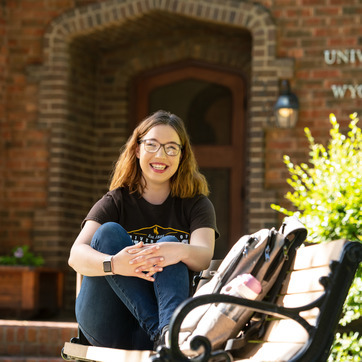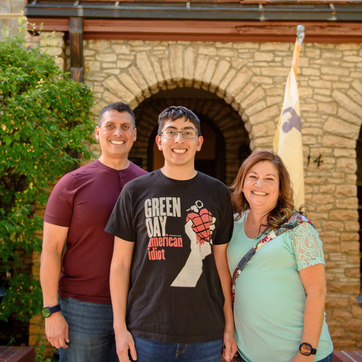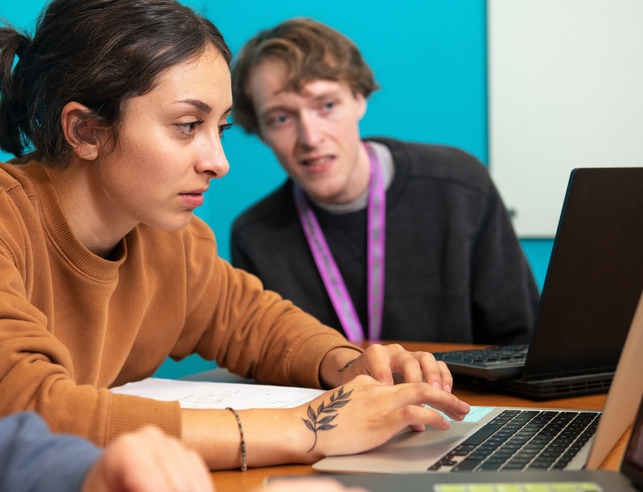Student FAQ's

Under the law, only those with a “need to know” may see the documentation. Faculty do not need to review diagnostic information about a student’s disability. Faculty do need to know what accommodations are necessary to provide the student with an equal educational opportunity.
If you are making the change from high school or work to attending a college, it can be quite an adjustment. Many students had a closely supervised high school experience with an IEP or a 504 plan in place wherein a team of professionals and your parents, and sometimes you, determined the services and assistance you would be provided in school. One of the major differences between high school and college is that in college you become the primary person responsible for asking for assistance because of a disability and for providing the necessary documentation and information to justify the services you request.
For more information, view our Transitioning to College from High School Guide!
Learning disabilities are usually diagnosed by a licensed professional, often a psychiatrist or a psychologist. The assessment consists of an intake interview, during which the professional takes a comprehensive medical and educational history; and the administration of several tests, usually including instruments to assess your cognitive abilities and your current achievement levels. The professional uses all of this information to determine if a learning disability is present, or if there may be other explanations for the educational difficulties you experience.
No, our office does not have the resources to provide testing services or diagnosis of any condition. We can however, provide you with a list of qualified professionals in the Laramie community as well as campus resources that do provide such a service. We would also be glad to visit with you to help you determine if an evaluation would be helpful.
Yes, if you have a disability and provide documentation that meets our guidelines. For a copy of the guidelines appropriate for your condition, please contact a DSS coordinator or request the guidelines from staff in the DSS main office, 109 Knight Hall or click here for the DSS application.
Yes, we do! These conditions may fall under the same guidelines as long-term or permanent disabilities. We will work with you and your instructors to be sure you are able to attend class, to assist with test taking and notetaking needs (e.g. if you've broken your dominant wrist or hand), give you resource information on transportation and parking options (if you've experienced a temporary change in mobility), etc.
No, DSS serves any qualified student regardless of enrollment status. Even if you are a part-time or outreach student.
You are responsible for requesting accommodations and services through DSS. You may find, if you ask for accommodations from your instructors, they will ask you to work through DSS to help verify for them that what you are requesting is appropriate.
Yes, DSS also works with faculty, staff, and visitors with disabilities by:
- Providing assistance to any UW department seeking to make their programs and services accessible to visitors who have disabilities.
- Working with UW administration to recommend physical and programmatic modifications still needed to improve the accessibility of our facilities and programs.
- Working to coordinate interpreting or transcription services for events such as cultural programming, graduation and other campus activities.
Listed below are a few resources that might be helpful in gaining access to adaptive software and technology. Still have questions? Connect with your DSS coordinator!
- Wyoming Assistive Technology Resource Program: WATR is a program allowing Wyoming residents with low incomes to apply for reduced-interest loans to purchase assistive technology and services. The WATR website can be accessed here: https://www.uwyo.edu/wind/watr/index.html
- Division of Vocational Rehabilitation (DVR): A State and Federally sponsored program that provides services and advocacy for individuals with disabilities resulting in employment. DVR will often pay for devices and accommodations for students who are seeking education to fulfill employment goals. Students must be a client of DVR.
- To apply to DVR: Visit 3817 Beech Street, #100, Laramie, WY 82070 or call (307) 745-3160.
Staff/Faculty FAQ's

We welcome questions and ask faculty to contact the coordinator listed on the student’s accommodation letter or AIM profile. The student’s coordinator will have a better understanding of the student and their needs and is the best place to start your conversation. If you have questions about exam accommodations, our testing team may also be able to assist and answer most questions.
If you are comfortable, you are always welcome to refer students directly to our office. Sometimes, these conversations can be tricky and we are also happy to consult and learn more about each specific situation.
You are welcome to talk with the student about the request and determine if you are able to accommodate. Any official accommodation will come from our office or a letter from the AIM portal. If you have any questions or concerns, please contact our office as soon as you can.
It depends. Some students have back-to-back classes where taking an exam with accommodations needs to be rescheduled. Some students also have medical conditions that flare up in the morning or evening. Also, we have to work with students to schedule them within our operating hours. This may mean scheduling a student earlier in the day or scheduling them for a later time.
Our team will work with faculty to discuss any alternative exam times and are happy to connect to discuss alternatives to exam schedules.
Extended time usually only is implemented when an exam has a timed component (i.e. a timer or countdown clock begins and ends an exam.) If your exams are scheduled to be taken within a certain period but has no timer, then extra time may not be required. If in doubt, please contact our office. Students who have a week to take an untimed exam, should not need extra time to complete, except in unique circumstances.
Faculty and Students will get a reminder message about any exams that are scheduled to be proctored or administered in the DSS office.
That is a great question. It is a good idea to give a DSS team member a call to consult and determine if our office and/or other supports would be helpful. Faculty are also encouraged to complete a CARES report with the Dean of Students if there are any concerns related to a student’s classes or health.
Adding Extra Time for online exams should be accessible in WyoCourses/Canvas. For troubleshooting, the Ellbogen Center for Teaching and Learning (ECTL) team should be able to assist with the LMS software.
Contact our office and the student’s coordinator to begin a conversation about your course. We can then discuss concerns, other supports, and determine next steps with you, the student, and other relevant parties.
Under the law, only those with a “need to know” may see the documentation. Faculty do not need to review diagnostic information about a student’s disability. Faculty do need to know what accommodations are necessary to provide the student with an equal educational opportunity.
Parent FAQ's

Yes! When signing up for a campus tour, there will be an area to indicate your interest in meeting with our office.
Information related to a student’s academics or other university related information is protected by FERPA. Students are welcome to share information with their family, but our office needs a release of information to share any information.
It is important for your student to register with our office. Our registration form is easy and found on our website. We are also happy to walk students through this process. Feel free to schedule a visit, email, or call the main office with any questions.
IEPs or 504 plans are great for starting the conversation with our office and our coordinators. We can review these plans to help inform our conversation and determine reasonable accommodations for UW.
All official accommodations at UW (academic, housing, dining, ESA) are implemented through our office. All students must register with our office and meet with a coordinator to receive support or accommodations.
Yes, temporary accommodations for classes or other campus activities can be implemented with the help of our office. This can include students with concussions, broken bones, etc.
Students do not need to resubmit documentation each semester. Once documentation is received and an accommodation plan is created and implemented, students can easily re-establish the same accommodations each semester. If students receive new documentation or new diagnosis, we are happy to review and connect with students to discuss any changes to their support or accommodations.


